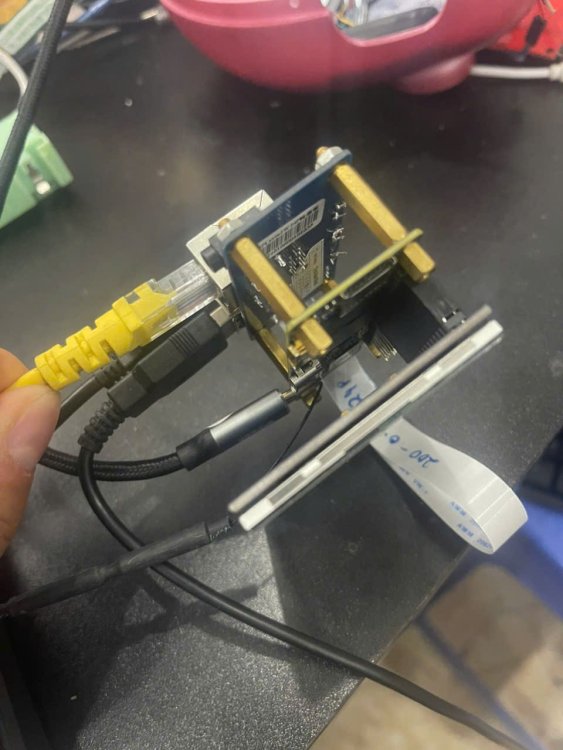All Activity
- Past hour
-
I think I solved it! In the upgraded system there was no package pahole! After I installed the pahole and reinstalled the package linux-headers-6.12.33-current-x86, I got the BTF stuff as described above in the .config file and I can compile modules! Pfff, finally! I checked the Raspberry Pi 4 version, I see no pahole package installed there, and I can compile modules and zfs. I don't see any BTF stuff in the .config there also. So, I don't know what is really going on here, I should install pahole on arm64 systems as well? And should pahole be included when you upgrade your system to 25.5.1 ?
- Today
-
Thanks a lot for your help, Igor. That did not make the trick, as the available packages are still in the old form (docker.io instead of docker-ce for example. Nonetheless, I now have a working (but old) docker binary, which is enough for my use case. Now, I will try to build a more recent docker binary. The next problem to solve will be to get the NVMe to work. I'm sorry your F3 died.
-

Orange pi zero2W supports built in microphone input or not
ag123 replied to QwertyOrange's topic in Allwinner sunxi
accordingly H618 do not have mic in hardware https://www.cnx-software.com/2023/07/03/orange-pi-zero-3-allwinner-h618-sbc-ships-with-up-to-4gb-ram/ hence, an option is to use a usb soundcard / dongle https://www.aliexpress.com/w/wholesale-usb-sound-card.html there are also those 'arduinoish' approaches e.g. to use a ADC module board e.g. https://www.ti.com/lit/ds/symlink/ads1110.pdf https://www.aliexpress.com/w/wholesale-ads1110.html https://www.instructables.com/Arduino-and-the-TI-ADS1110-16-bit-ADC/ but that you would need to hack the pin interfaces to use i2c etc. note it seemed ads1110 is a bit too slow for sound. alternatives are like stm32, which has built-in adc that can go to like 1-2.5 Msps, but you would need to hack the spi interface etc. the 'easiest / cheapest' way seemed to be generic 'usb sound cards' -
Has a fixed image been posted? Just upgraded to 25.5 from 25.2, so havent tested a new image download yet.
-
probably best to specify location for any sales offer
-

Banana Pi - Armbian Buildsystem | Development Team
laibsch replied to hexzhen3x7's topic in Advanced users - Development
What is the status here?- 6 replies
-
- Banana Pi M4 Zero
- Banana Pi M7
-
(and 18 more)
Tagged with:
- Banana Pi M4 Zero
- Banana Pi M7
- Banana Pi F3
- Banana Pi M5 Pro
- Banana Pi
- Banana Pi BPi-M2+
- Banana Pi BPI-M64
- Banana Pi BPI-M1+
- Banana Pi BPI-M2
- Banana Pi BPI-M2U
- Banana Pi BPI-M2 ZERO
- Banana Pi BPI-M3
- Banana Pi BPI-R2
- Banana Pi BPI-M1
- Banana Pi BPI-M2 Pro
- Banana Pi M5
- Banana Pi BPi-M2S
- Banana Pi BPI-R2 Pro
- Bananapi CM4 io
- Banana Pi Pro
-

Orange pi zero2W supports built in microphone input or not
laibsch replied to QwertyOrange's topic in Allwinner sunxi
The OrangePi Zero 2w is maintained by the community and chraac in particular. Maybe try to contact him by e-mail if you don't get a response here. Or talk to other owners of the device here in the forum to see if they can answer your question. - Yesterday
-
Hi all, If anyone is interested, I have a Helios64 backup battery pack lying around that I did order back in the day, but never got around to installing/using it. (Have a separate UPS.) From my guess this thing is <6 years old, but again, never seen any charge or discharge. PM me when interested. Groetjes, PS Available for pickup in the San Jose, Bay Area, CA (USA) or can send domestically thru USPS.
-

How install Armbian to tvbox Ugoos SK1 ( chip S928X-K )
SteeMan replied to Nguyễn Tất Hùng's topic in Amlogic CPU Boxes
@Nguyễn Tất Hùng If you want to use Armbian, you should start here: https://www.armbian.com/amlogic-s9xx-tv-box/ And specifically look at the link to the Status of TV Boxes on Armbian information. -

How to install armbian in h618?
Алексей Торопов replied to alienxz77b's topic in Allwinner CPU Boxes
What about the speed? iperf3 report about 55-58 Mbits/sec -
@robertoj there are some 'old' stuff that may not be fully relevant but still useful this gist likely helps: https://gist.github.com/ag88/de02933ba65500376d1ff48e504b1bf3 an 'old' post: Note that currently in the minimal image netplan is set to systemd-networkd https://docs.armbian.com/User-Guide_Networking/#minimal-images I'm less familiar with systemd-networkd, though it is possible to setup the network fully with it. What i did currently, is to update netplan config as above to use NetworkManager After that I use NetworkManger to setup a bridge adding the ethernet interface. https://gist.github.com/ag88/de02933ba65500376d1ff48e504b1bf3 . However, I actually make NetworkManager *unmanage* the Wifi interface, because i'm using hostapd. I'm using hostapd mainly because in journalctl logs, there is an entry for every host/client that connects. I'm not sure about how to do the same with Network Manager. hostapd also supports elaborate RADIUS authentication if one wants to go the distance. Then I install and configure hostapd as described in the gist, and during startup, hostapd actually patch the wifi interface into the bridge that is setup with NetworkManager.. The configuration for wifi AP is completely done in hostapd.conf as described in the gist. I'm using a bridge as DHCP is managed from my gateway router, hence I did not run a separate DHCP server instance in Orange Pi Zero 3 itself. An alternative setup is to setup NAT (network address translation) on the Orange Pi Zero 3 and to run a DHCP server on the Orange Pi Zero 3 itself. I think NAT approach is 'more common' I'm using hostapd, but I think without hostapd, it is also possible to setup an AP using NetworkManager alone. i.e. to let Network Manager manage the Wifi interface, and configure it as an AP. The benefit here is that Network manager woulld likely manage the DHCP and NAT as well all from Network Manager configurations. As I'm doing everything from the command line, I used NetworkManager cli (nmcli) for all the network manager configuration tasks. Note that while messing with networking, it is necessary to work in the serial debug console using a usb-uart dongle. i.e. bootup and login as root using a usb-uart dongle to the 3 'debug' pins for the serial console.
-
@ScoreABSM I don't think that is the reason? No, I haven't solved the Bluetooth issue. I have theories, but I still haven't cracked the nut. You are more than welcome to give it a whirl
-
Last year, I tried to set up "Access Point" mode in orange pi zero 3 and never got it working. Do you have a link to the instructions to make it work?
-

Orangepi Zero 2W wrong color display on MPI3501
robertoj replied to Minh Tiến Nguyễn's topic in Allwinner sunxi
Nice Are you going to use apps that will need high fps? If so, comment about the performance. Does the touch function feel steady and reliable? (dragging windows without jumpiness, with the stylus) The app for keyboard emulation with touch screen is "matchbox", if you need it. -

How install Armbian to tvbox Ugoos SK1 ( chip S928X-K )
Werner replied to Nguyễn Tất Hùng's topic in Amlogic CPU Boxes
This is not Armbian. It is a fork that uses the name Armbian without permission. Also they do not contribute to the project. If you have questions about their images you have to ask at their place. -

How install Armbian to tvbox Ugoos SK1 ( chip S928X-K )
Werner replied to Nguyễn Tất Hùng's topic in Amlogic CPU Boxes
no. I don't deal with tvboxes -

How install Armbian to tvbox Ugoos SK1 ( chip S928X-K )
Werner replied to Nguyễn Tất Hùng's topic in Amlogic CPU Boxes
moved -
Hi ok, I got a bit deeper. I installed the Armbian build framework and compiled the kernel. ./compile.sh build BOARD=uefi-x86 BRANCH=current BUILD_DESKTOP=no BUILD_MINIMAL=yes KERNEL_CONFIGURE=yes RELEASE=noble ENABLE_EXTENSIONS= Then I got 3 deb files: - I installed the first 2 (libc-dev was complaining) and then I could compile and load the zfs module (and also the dummydriver)! At first I used KERNEL_CONFIGURE=no with the compile script, and gave me 3 deb files from the ghcr.io/armbian/os/ repository without compiling the kernel, but these don't work! Notice also the sizes of the deb files are much smaller. I compared the 2 .config files of the one from the repository and the one that was compiled:
-

Orangepi Zero 2W wrong color display on MPI3501
Minh Tiến Nguyễn replied to Minh Tiến Nguyễn's topic in Allwinner sunxi
Hi @robertoj Yes thank you for helping me For this board, i am using armbian follow this link https://www.armbian.com/orange-pi-zero-2w/ which is Armbian 25.5.1 Kernel: 6.12.23 Yes i use my 5 different sd card to back up and try so many os (at first i want the OS using fb_ili9486 to make it work just like raspberry pi 4) Yes after modify the device tree and add calib configuration, i just plug and play, for the orange pi zero 2w it look like this -
just like to say that I installed Armbian_community_25.8.0-trunk.228_Orangepizero3_bookworm_current_6.12.30_minimal.img from the boards page https://www.armbian.com/orange-pi-zero-3/ apt update works 'out of the box', no PUBKEY errors I really liked the new MOTD on login _ _ _ _ _ /_\ _ _ _ __ | |__(_)__ _ _ _ __ ___ _ __ _ __ _ _ _ _ (_) |_ _ _ / _ \| '_| ' \| '_ \ / _` | ' \ / _/ _ \ ' \| ' \ || | ' \| | _| || | /_/ \_\_| |_|_|_|_.__/_\__,_|_||_|_\__\___/_|_|_|_|_|_\_,_|_||_|_|\__|\_, | |___| |__/ v25.8 rolling for Orange Pi Zero3 running Armbian Linux 6.12.30-current-sunxi64 Packages: Debian stable (bookworm) Updates: Kernel upgrade enabled and 8 packages available for upgrade Support: for advanced users (rolling release) WiFi AP: SSID: (wifi_hotspot_name), Performance: Load: 12% Up time: 0 min Memory usage: 5% of 3.83G CPU temp: 54°C Usage of /: 3% of 58G RX today: 6 MiB Commands: Configuration : armbian-config Upgrade : armbian-upgrade Monitoring : htop running Armbian on Orangepizero 3 makes a good desktop wifi hotspot (AP) it counts among the fastest Wifi with UWE5622 AP on 5 ghz on 'cheap' SBC (single board computers) https://docs.armbian.com/WifiPerformance/#uwe-5622 if you see that updates message, what is more cool is if you run apt list --upgradable it list the packages that is upgradable, and I tried apt upgrade install quite a few things, then manually reboot it becomes 25.8.0-trunk.230 ! this can be verified in /etc/armbian-release






